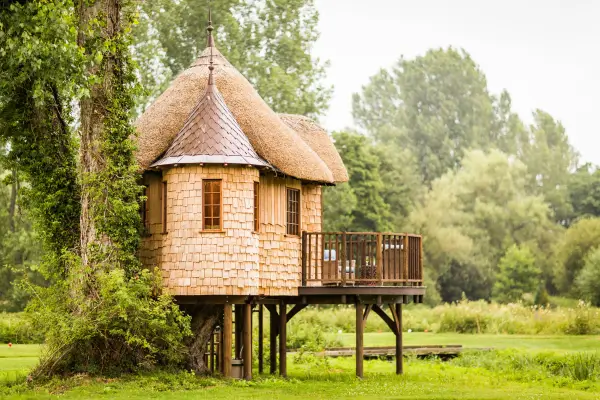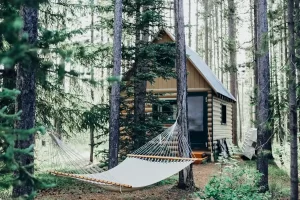In recent years, there has been a noticeable shift in the way people approach travel. The growing awareness of environmental issues, coupled with the desire to minimize one’s carbon footprint, has led to a significant rise in sustainable and eco-friendly travel. Modern travelers are increasingly seeking experiences that not only allow them to explore new destinations but also do so in a way that respects and preserves the environment. This trend is reflected in the rise of eco-conscious accommodations, where sustainability is at the forefront, offering travelers a way to enjoy nature without compromising the well-being of the planet.
Among the various options available for sustainable travel, unique green getaways have gained immense popularity. Accommodations like treehouses, eco-resorts, and off-the-grid retreats offer more than just a place to stay—they provide an immersive experience that connects guests with nature in a profound way. These distinctive lodgings are not only designed with environmental stewardship in mind but also offer a sense of adventure and novelty. Whether it’s waking up in a canopy-level treehouse or indulging in the luxuries of an eco-resort powered by renewable energy, these green getaways cater to the growing demand for experiences that are both memorable and mindful of the environment.
Treehouses: Elevated Adventures in Nature
The Appeal of Treehouse Accommodations
Treehouses have long captured the imagination of travelers, offering a unique blend of adventure, nostalgia, and a deep connection with nature. Unlike traditional accommodations, treehouses allow guests to live among the treetops, providing a bird’s-eye view of the surrounding landscape. This integration with nature is one of the primary appeals of treehouse stays, as it offers an unparalleled opportunity to immerse oneself in the natural world. The gentle sway of the trees, the sounds of the forest, and the sight of wildlife from your window create a serene and enchanting environment. Treehouse accommodations often prioritize sustainability, using natural materials, and minimizing environmental impact, making them a perfect choice for eco-conscious travelers seeking both comfort and conservation.
Notable Treehouse Getaways
Costa Rica: Finca Bellavista
Nestled in the lush rainforests of Costa Rica, Finca Bellavista offers a truly off-grid experience that epitomizes the concept of living in harmony with nature. This self-sustaining community of treehouses is completely immersed in the rainforest, where the canopy provides both shelter and a habitat for an incredible diversity of wildlife. Guests can enjoy the simplicity of life off the grid, with treehouses that are powered by renewable energy and designed to blend seamlessly with the environment. Each treehouse is connected by a network of suspension bridges, creating a floating village in the treetops. At Finca Bellavista, the focus is on sustainable living, and guests are encouraged to explore the forest, participate in conservation efforts, and experience the wonders of Costa Rica’s biodiversity firsthand.
Sweden: Treehotel
Located in the remote forests of northern Sweden, Treehotel is a masterclass in innovative design and sustainable practices. This collection of uniquely designed treehouses—each created by a renowned architect—offers guests a chance to experience nature in a way that is both modern and eco-friendly. The Mirrorcube, a standout among the designs, is camouflaged by reflective surfaces that blend it into the surrounding forest, creating an almost invisible retreat. Another, the UFO, offers a playful, extraterrestrial experience suspended among the pines. Treehotel’s commitment to sustainability is evident in its use of locally sourced materials, energy-efficient systems, and minimal environmental impact. By staying at Treehotel, guests not only enjoy the beauty and solitude of the Swedish wilderness but also support a vision of sustainable luxury that redefines what it means to connect with nature.
India: The Machan
Perched high in the Western Ghats, The Machan offers a luxurious treehouse experience that combines eco-friendly practices with opulent comfort. Each treehouse, or “machan,” is designed to maximize natural light and airflow, reducing the need for artificial lighting and air conditioning. Built from locally sourced materials, these treehouses rise above the forest floor, offering panoramic views of the lush surroundings. The Machan is not just a place to stay but a sanctuary where guests can unwind and reconnect with nature. The property is set within a private tropical forest, ensuring both privacy and immersion in the natural world. From stargazing from the open-air decks to exploring the forest trails, The Machan provides an experience that is both luxurious and deeply rooted in the principles of sustainability.
Eco-Resorts: Luxury Meets Sustainability
Eco-resorts represent a harmonious blend of luxury and environmental stewardship, offering travelers an opportunity to enjoy high-end accommodations while minimizing their impact on the planet. Unlike traditional resorts, eco-resorts prioritize sustainability in every aspect of their operations, from energy use to waste management. These resorts are often situated in pristine natural environments and are designed to preserve and protect these areas. By integrating eco-friendly practices such as renewable energy, water conservation, and sustainable sourcing of materials, eco-resorts aim to reduce their ecological footprint while providing guests with a unique and responsible travel experience. The impact of eco-resorts on sustainable tourism is profound, as they not only set a high standard for environmentally conscious travel but also educate and inspire guests to adopt more sustainable practices in their own lives.
Standout Eco-Resorts Worldwide
Maldives: Soneva Fushi
Soneva Fushi, located in the idyllic Maldives, is a pioneering eco-resort that exemplifies a commitment to sustainability and luxury. Known for its “barefoot luxury” philosophy, Soneva Fushi offers a unique blend of comfort and environmental responsibility. The resort is dedicated to achieving a zero-waste goal, with an impressive recycling program that repurposes nearly all waste generated on the island. Soneva Fushi also places a strong emphasis on marine conservation, actively participating in coral restoration projects and protecting the local marine ecosystem. Guests can engage in educational experiences, such as guided snorkeling tours with marine biologists, to learn about the importance of preserving the delicate coral reefs. Soneva Fushi’s approach to sustainability extends to its culinary offerings, with organic, locally sourced ingredients and a focus on reducing food waste. This eco-resort not only provides a luxurious escape but also fosters a deeper connection to the natural world and a greater awareness of the need for conservation.
Australia: Daintree Eco Lodge
Nestled in the heart of the Daintree Rainforest in Queensland, Australia, Daintree Eco Lodge offers an eco-luxury experience that immerses guests in one of the world’s oldest and most diverse rainforests. The lodge is committed to sustainable practices that preserve the unique biodiversity of the Daintree, including the use of renewable energy sources, rainwater harvesting, and eco-friendly building materials. Each of the lodge’s private treehouse-style accommodations is designed to blend seamlessly with the surrounding forest, offering stunning views and a tranquil escape. Guests can explore the rainforest through guided walks led by local Indigenous guides, who share their knowledge of the area’s flora, fauna, and cultural significance. The lodge also supports local conservation efforts, contributing to the protection of endangered species and the preservation of the rainforest. At Daintree Eco Lodge, luxury is not just about comfort; it’s about experiencing nature in a way that respects and protects the environment.
Tanzania: Chumbe Island Coral Park
Chumbe Island Coral Park in Tanzania is a shining example of how eco-tourism can play a critical role in marine conservation. This private island resort is dedicated to the preservation of coral reefs and marine life, making it a haven for nature lovers and conservationists alike. The resort operates as a non-profit, with all revenues reinvested into conservation and education programs. Chumbe Island is home to one of the most pristine coral reefs in East Africa, and the resort has established a no-take marine reserve to protect this fragile ecosystem. Guests can participate in guided snorkeling tours, learning about the vibrant marine life and the importance of coral reef conservation. The resort itself is designed with sustainability in mind, featuring solar-powered bungalows, rainwater catchment systems, and composting toilets. Chumbe Island Coral Park offers a rare opportunity to experience untouched natural beauty while contributing to the preservation of one of the world’s most valuable ecosystems.
Glamping: The Perfect Blend of Comfort and Nature
Glamping, a portmanteau of “glamorous” and “camping,” has emerged as a popular trend among travelers seeking to experience the great outdoors without sacrificing comfort. This unique form of accommodation offers the thrill of camping—immersed in nature and away from the hustle and bustle of urban life—while providing the luxurious amenities typically found in high-end hotels. Glamping appeals to eco-travelers for its ability to combine sustainability with comfort, often featuring accommodations that are both stylish and environmentally conscious. Whether it’s a yurt in the mountains or a safari tent in the savannah, glamping sites are designed to offer a close connection to nature, using eco-friendly materials and practices to minimize their impact on the environment. This blend of comfort and conservation has made glamping a favorite among those who want to enjoy nature responsibly without giving up on the finer things in life.
Exceptional Glamping Sites
New Zealand: PurePods
PurePods in New Zealand takes glamping to a new level with its innovative glass cabins, designed to offer an immersive nature experience like no other. Located in remote and stunningly beautiful locations across the country, each PurePod is made entirely of glass, including the floors, ceilings, and walls, providing 360-degree views of the surrounding landscape. Guests can stargaze from the comfort of their bed or watch the sunrise over the mountains without ever leaving their cabin. Despite the luxurious feel, PurePods are committed to sustainability, featuring solar power, rainwater collection, and environmentally friendly waste systems. The minimalist design and off-grid locations ensure that guests can truly disconnect and appreciate the natural beauty of New Zealand in its purest form. PurePods offers a unique blend of luxury and simplicity, making it an ideal choice for eco-conscious travelers looking to experience nature in an unforgettable way.
South Africa: Tanda Tula
Located in the heart of the Timbavati Private Nature Reserve, adjacent to Kruger National Park, Tanda Tula offers an exceptional glamping experience that combines the excitement of a safari with eco-friendly accommodations. The luxurious tents at Tanda Tula are designed to blend seamlessly with the surrounding bushveld, offering an authentic yet comfortable stay. Each tent is equipped with all the modern amenities, including en-suite bathrooms, while still providing a true wilderness experience. The camp’s commitment to sustainability is evident in its use of solar power, water conservation measures, and its efforts to minimize waste. Guests at Tanda Tula can enjoy guided safari walks and game drives, led by expert guides who share their knowledge of the local wildlife and ecosystem. The combination of luxury, sustainability, and the thrill of encountering Africa’s iconic animals in their natural habitat makes Tanda Tula a standout glamping destination for eco-travelers.
Canada: Clayoquot Wilderness Lodge
Clayoquot Wilderness Lodge, located in the temperate rainforests of British Columbia, Canada, offers a glamping experience that perfectly balances luxury with minimal environmental impact. Accessible only by boat or seaplane, this remote lodge provides a secluded retreat where guests can immerse themselves in the rugged beauty of the Canadian wilderness. The lodge’s canvas tents are elegantly furnished with antiques, plush bedding, and en-suite bathrooms, ensuring a comfortable stay amidst the natural surroundings. Clayoquot Wilderness Lodge is deeply committed to sustainability, with initiatives such as reducing energy consumption, supporting local conservation efforts, and engaging in habitat restoration projects. Activities at the lodge range from wildlife viewing and hiking to kayaking and fishing, allowing guests to explore the stunning landscapes and diverse ecosystems of the region. By offering a luxurious escape that remains true to its environmental principles, Clayoquot Wilderness Lodge exemplifies the best of what glamping has to offer.
Off-the-Grid Retreats: Disconnect to Reconnect
In an increasingly connected world, the appeal of off-the-grid living is growing among travelers who seek to escape the constant demands of modern life. These retreats offer an opportunity to disconnect from technology and the hustle of daily routines, allowing guests to immerse themselves in nature and embrace a simpler way of living. Off-the-grid accommodations are often located in remote, pristine environments where modern amenities are minimal, but the rewards are abundant—solitude, tranquility, and a deep connection with the natural world. The allure of these retreats lies in their ability to provide a true escape, where the absence of electricity, Wi-Fi, and other conveniences forces guests to slow down, reconnect with themselves, and appreciate the beauty of the surrounding landscape. For many eco-conscious travelers, off-the-grid living also represents a commitment to sustainability, as these accommodations often prioritize low-impact practices, renewable energy sources, and self-sufficiency.
Top Off-the-Grid Destinations
Norway: Manhausen Island
Manhausen Island, located in the remote and rugged landscape of northern Norway, offers a perfect example of off-the-grid living with a focus on sustainability. This private island retreat features a collection of modern cabins, each designed to blend seamlessly with the surrounding natural beauty. The cabins, with their minimalist design and panoramic glass walls, provide stunning views of the sea and mountains, allowing guests to feel fully immersed in the landscape. Manhausen Island operates on renewable energy, with a commitment to minimizing its environmental impact while providing a comfortable and serene escape. Activities such as kayaking, hiking, and fishing are available for guests to explore the pristine wilderness. The combination of cutting-edge design, sustainable practices, and the remote setting makes Manhausen Island an ideal destination for those looking to truly disconnect and reconnect with nature.
Portugal: Cabanas no Rio
Cabanas no Rio, located along the banks of the Sado River in Portugal, offers a serene off-the-grid retreat that is as minimalist as it is beautiful. These two small wooden cabins, crafted from reclaimed materials, provide a simple yet elegant escape from the pressures of modern life. The cabins are designed to embrace the natural surroundings, with large windows that open up to the river, allowing guests to fully appreciate the tranquil environment. Cabanas no Rio operates with a minimal environmental footprint, using solar power for electricity and a wood-burning stove for heating. The focus here is on simplicity and serenity, encouraging guests to slow down, enjoy the quiet, and reconnect with the natural world. Whether watching the sunrise over the river or enjoying a quiet moment on the cabin’s deck, Cabanas no Rio offers a peaceful and restorative experience for those seeking a true getaway.
USA: Treebones Resort
Treebones Resort, located in the stunning coastal region of Big Sur, California, offers a unique off-the-grid experience with its collection of yurts and sustainable practices. Perched on a hillside overlooking the Pacific Ocean, Treebones Resort provides guests with breathtaking views and a deep sense of connection to the natural environment. The resort’s yurts are designed to be eco-friendly, featuring canvas walls, skylights for natural light, and minimal use of electricity. Treebones is committed to sustainability, with initiatives such as an on-site organic garden, composting, and a focus on reducing waste. Guests can enjoy activities like hiking, whale watching, and yoga, all while surrounded by the rugged beauty of Big Sur. The combination of unique accommodations, stunning natural surroundings, and a strong commitment to environmental stewardship makes Treebones Resort a standout destination for travelers looking to experience off-the-grid living in one of California’s most iconic landscapes.
The Impact of Green Getaways on Sustainable Tourism
Encouraging Responsible Travel
Unique green getaways, such as treehouses, eco-resorts, glamping sites, and off-the-grid retreats, play a pivotal role in promoting responsible travel. These accommodations offer more than just a place to stay; they embody the principles of sustainable tourism by prioritizing environmental stewardship, minimizing their ecological footprint, and encouraging guests to engage in mindful travel practices. By staying at these eco-friendly destinations, travelers are often educated on the importance of conservation and the impact their choices have on the environment. These green getaways inspire travelers to adopt sustainable habits, such as reducing waste, conserving water, and supporting local conservation efforts. Additionally, by choosing accommodations that prioritize sustainability, travelers are sending a powerful message to the tourism industry about the growing demand for responsible travel options. As more people seek out these types of experiences, the tourism sector is encouraged to invest in and develop more eco-friendly practices, ultimately leading to a more sustainable future for travel.
Supporting Local Communities
Eco-accommodations also play a crucial role in supporting local communities and ecosystems. Many of these green getaways are situated in remote or rural areas, where tourism can provide essential economic opportunities for local residents. By employing local staff, sourcing materials and produce locally, and partnering with community-based initiatives, these accommodations help to sustain the livelihoods of those living in the surrounding areas. Furthermore, eco-resorts and off-the-grid retreats often engage in conservation projects that protect local ecosystems, such as reforestation efforts, wildlife preservation, and marine conservation. These initiatives not only safeguard the environment but also ensure that the natural resources that local communities depend on are preserved for future generations. In some cases, eco-accommodations contribute to the cultural preservation of indigenous communities by incorporating traditional practices and knowledge into their operations and guest experiences. By choosing to stay at these destinations, travelers are directly contributing to the well-being of local communities and the protection of fragile ecosystems, making their travel experience not only enjoyable but also impactful.
Conclusion
Unique green getaways, from treehouses nestled in the treetops to eco-resorts that blend luxury with sustainability, offer more than just an escape—they represent a growing movement towards responsible and environmentally conscious travel. These accommodations allow travelers to immerse themselves in nature while minimizing their impact on the environment. They highlight the importance of preserving natural habitats, supporting local communities, and promoting sustainable tourism practices. Whether it’s the thrill of staying in a remote treehouse, the comfort of a luxurious eco-resort, or the adventure of an off-the-grid retreat, these experiences provide a unique opportunity to reconnect with nature and explore the world in a way that respects and protects our planet.
As the world continues to face environmental challenges, the choices we make as travelers have never been more important. By choosing to stay at eco-friendly accommodations, you not only enjoy a memorable and unique experience but also contribute to the preservation of the environment and the support of local communities. The next time you plan a vacation, consider one of these sustainable options. Whether you’re seeking adventure, relaxation, or a deeper connection with nature, there’s a green getaway that can meet your needs while ensuring that future generations can enjoy the same natural beauty that you do today. Make your next trip one that leaves a positive impact on the world by embracing the principles of sustainable travel.




